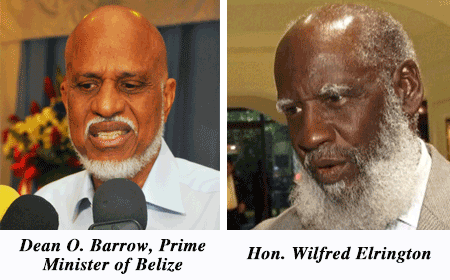BELIZE CITY, Thurs. May 2, 2019– On Sunday, April 15, 2018, Guatemala held its referendum on whether to take its claim to the International Court of Justice (ICJ),in conformity with the protocol of the Special Agreement signed between Belize and Guatemala at the Organization of American States (OAS) headquarters in Washington, DC, on December 8, 2008. Next Wednesday, May 8, Belize will hold its ICJ referendum.
There are vast differences between the Guatemalan ICJ referendum and the one in which Belizeans will vote next week. Prior to the Guatemalans holding their referendum, the Special Agreement went through all the necessary checks in their domestic system.
The Special Agreement, which became a treaty between Belize and Guatemala, did not go through the kind of rigorous scrutiny in Belize that it was subjected to in Guatemala, before they signed onto it.
After the OAS Secretary General made the recommendation in November 2007 for the two countries, Belize and Guatemala, to consider submitting the territorial differendum to the ICJ, both countries’ governments were supposed to respond to the Secretary General’s recommendation.
On May 29, 2008, Belize’s Minister of Foreign Affairs, Hon. Wilfred Elrington, responded to OAS Secretary General Jose Miguel Insulza via a letter in which he confirmed that the Government of Belize was fully committed to resolving the territorial dispute with the Government of Guatemala.
Elrington told the OAS Secretary General, “Having considered your proposal on a way forward, I have the honor to inform you that subject to the approval of the Belizean people my government will be taking the necessary steps to act upon your recommendation to submit the matter to the International Court of Justice.”
In his background to the Study of the Special Agreement, the Guatemalan attorney, Gustavo Adolfo Orellana Portillo, wrote on page 75, “On 16 June 2008, Foreign Minister Haroldo Rodas Melgar confirmed the Guatemalan position to the Secretary General of the OAS, stating the following: ‘I confirm to Your Excellency the position of the government of Guatemala, put forward by our Foreign Ministry through note date 17 December 2007, whereas it accepts submitting the differendum before the International Court of Justice. I reiterate that the submittal of the differendum to the jurisdiction of said organ will be done once the constitutional requirements pertaining to the State of Guatemala have been fulfilled’.”
The Special Agreement has had to pass muster in the Guatemalan system even from its Ministry of National Defense. But that was not the case with Belize.
Under the Belize Referendum Act, there is a provision which says that there has to be a referendum with regard to any proposed settlement of the Guatemalan claim. It is under that section of the law that the Barrow government got the Governor General to sign writs of referendum which were flawed and for which Chief Justice, Hon. Kenneth Benjamin, granted the interim injunction to halt the April 10 ICJ referendum.
The Government of Belize, having bungled the process when it went and signed the Special Agreement with Guatemala without consulting anyone in the country, much less the Belizean people, ended up blaming the Opposition for stopping the April 10 ICJ referendum.
The duplicity of the government did not stop there, however. In total disrespect to the Judiciary, Prime Minister Barrow introduced a new referendum bill that became an act of parliament under which the government will now hold the ICJ referendum on May 8.
So in essence, Belizeans are being called to vote in an illegal referendum, because the government failed to get the interim injunction discharged. Furthermore, the new referendum law, the Belize Territorial Dispute Referendum Act of 2019, cites the very Special Agreement as the basis for holding the referendum, and it is the Special Agreement that the Opposition, People’s United Party parliamentarians and standard bearer are challenging.
The PUP’s constitutional challenge of the Special Agreement is based on the principle that the Executive arm of the government violated the principle of the separation of powers, when it entered into the Special Agreement Treaty with the Government of Guatemala without first taking it to the House of Representatives for approval. This principle is elaborated upon in the joint legal opinion of attorneys Anthony Sylvestre, Richard “Dickie” Bradley and Kareem Musa.
So now the court is being asked to determine the constitutionality of the Special Agreement and in the PUP’s amended claim, the court is also being asked to determine the constitutionality of the Belize Territorial Dispute Referendum Act of 2019.
If the court finds that the Special Agreement is unconstitutional, then by extension, the results of the referendum will similarly be affected. If this happens, millions of dollars would have gone to waste and we will be nowhere closer to solving the Guatemalan claim than we were in December 2008 when the government signed the Special Agreement.

